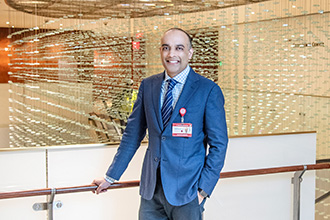The results of a five-year, multi-center clinical trial testing an innovative combination of an adenovirus and an immune checkpoint inhibitor against recurrent glioblastoma were published this week in Nature Medicine. The Phase 1/2 trial was conducted at multiple sites around the United States, including at NewYork-Presbyterian Weill Cornell Medicine, where Dr. Rohan Ramakrishna was the principal investigator. The trial, the first of its kind in humans, showed the combination to be safe, with few adverse effects, and with encouraging survival times in some patients.
“Glioblastoma is a devastating diagnosis, and the need for effective therapies is critical,” said Dr. Ramakrishna, the Alvina and Willis Murphy Associate Professor of Neurological Surgery and director of the Brain Metastases Program at the Weill Cornell Medicine Brain and Spine Center. He is also co-director of the William Rhodes and Louise Tilzer-Rhodes Center for Glioblastoma at NewYork-Presbyterian. “After initial treatment, the tumor tends to recur after about seven months, with survival times generally about six months after recurrence. We believe immunotherapy holds great promise for extended survival in some patients with this diagnosis, and I’m eager to see where this line of investigation leads.”
In the trial, known as Combination Adenovirus + Pembrolizumab to Trigger Immune Virus Effects (CAPTIVE), 49 patients were given an injection of DNX-2401, a genetically modified oncolytic adenovirus, directly to the tumor, followed by intravenous pembrolizumab (an immune checkpoint inhibitor known by its brand name, Keytruda). Treatments were administered every three weeks for up to two years, or until disease progression.
Median overall survival was 12.5 months, and three of the 49 patients remain alive at 45, 48, and 60 months. More than half of the patients treated (56.2 percent) showed a clinical benefit (defined as stable disease or better).
“I’m encouraged,” said Dr. Ramakrishna. “In some patients, we were able to elicit an anti-tumor response by using the oncolytic virus with an assist from checkpoint inhibition. Getting an individual’s own immune system to attack and eradicate a growing Glioblastoma is an exciting avenue of research that may one day change the treatment landscape for glioblastoma patients.”
“The prospect of an effective treatment for glioblastoma is tantalizing,” said Dr. Philip E. Stieg, the Margaret and Robert J. Hariri, MD ’87, PhD ’87 Professor of Neurological Surgery at Weill Cornell Medicine and Neurosurgeon-in-Chief of NewYork-Presbyterian/Weill Cornell Medical Center. “This disease has been uniformly fatal for so long, and I am gratified that Dr. Ramakrishna is at the forefront of this groundbreaking effort to improve the odds for patients.”
Read the paper here (open access) | More about glioblastoma | More about the clinical trial
More about Dr. Ramakrishna | More about the Brain Metastases Program
More about the William Rhodes and Louise Tilzer-Rhodes Center for Glioblastoma


